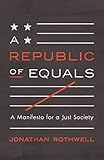A Republic of Equals : A Manifesto for a Just Society / Jonathan Rothwell.
Material type: TextPublisher: Princeton, NJ : Princeton University Press, [2019]Copyright date: ©2019Description: 1 online resource (392 p.) : 72 b/w illusContent type:
TextPublisher: Princeton, NJ : Princeton University Press, [2019]Copyright date: ©2019Description: 1 online resource (392 p.) : 72 b/w illusContent type: - 9780691183763
- 9780691189987
- 320.011 23
- JC578 .R684 2019
- online - DeGruyter
- Issued also in print.
| Item type | Current library | Call number | URL | Status | Notes | Barcode | |
|---|---|---|---|---|---|---|---|
 eBook
eBook
|
Biblioteca "Angelicum" Pont. Univ. S.Tommaso d'Aquino Nuvola online | online - DeGruyter (Browse shelf(Opens below)) | Online access | Not for loan (Accesso limitato) | Accesso per gli utenti autorizzati / Access for authorized users | (dgr)9780691189987 |
Frontmatter -- Contents -- Acknowledgments -- 1. Behind the Discontent -- 2. The Natural Foundations of a Just Society -- 3. Merit-Based Egalitarianism -- 4. The Importance of Equal Access to Public Goods and Markets -- 5. Unequal Access to Education -- 6. The Historical Contingencies of Group Differences in Skills -- 7. Unequal Access to Housing Markets -- 8. How Unequal Access to Housing Perpetuates Group Inequality and Injustice -- 9. Unequal Access to the Buying and Selling of Professional Services -- 10. Creating a Just Society -- Appendix -- Notes -- Index
restricted access online access with authorization star
http://purl.org/coar/access_right/c_16ec
Why political inequality is to blame for economic and social injusticePolitical equality is the most basic tenet of democracy. Yet in America and other democratic nations, those with political power have special access to markets and public services. A Republic of Equals traces the massive income inequality observed in the United States and other rich democracies to politicized markets and avoidable gaps in opportunity-and explains why they are the root cause of what ails democracy today.In this provocative book, economist Jonathan Rothwell draws on the latest empirical evidence from across the social sciences to demonstrate how rich democracies have allowed racial politics and the interests of those at the top to subordinate justice. He looks at the rise of nationalism in Europe and the United States, revealing how this trend overlaps with racial prejudice and is related to mounting frustration with a political status quo that thrives on income inequality and inefficient markets. But economic differences are by no means inevitable. Differences in group status by race and ethnicity are dynamic and have reversed themselves across continents and within countries. Inequalities persist between races in the United States because Black Americans are denied equal access to markets and public services. Meanwhile, elite professional associations carve out privileged market status for their members, leading to compensation in excess of their skills.A Republic of Equals provides a bold new perspective on how to foster greater political and social equality, while moving societies closer to what a true republic should be.
Issued also in print.
Mode of access: Internet via World Wide Web.
In English.
Description based on online resource; title from PDF title page (publisher's Web site, viewed 29. Jul 2021)


